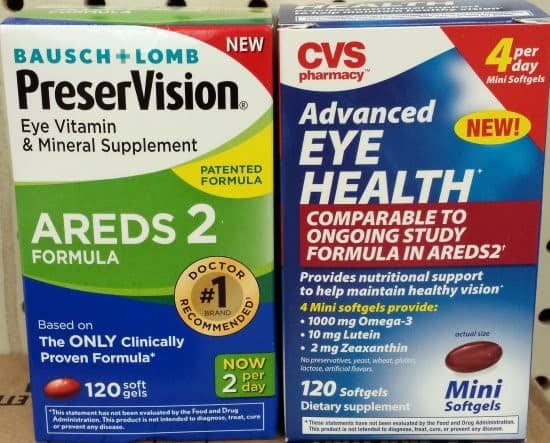A lawsuit has been filed against CVS Pharmacy claiming that the label on its Advanced Eye Health supplement is misleading to consumers. The lawsuit, filed in California by two men with age-related macular degeneration who purchased the CVS product, says that Advanced Eye Health lacks the vitamin C, vitamin E, zinc and copper that National Institute of Health studies deemed important to the formula.
Macular degeneration is a genetic disease occurring more frequently in individuals over the age of 50. The macula is responsible for detailed vision and is the central part of the retina. As the macula deteriorates, central vision is significantly affected. AMD (Age-related Macular Degeneration) is, in fact, a leading cause of blindness in the U.S.
The NIH recently sponsored two studies dubbed AREDS (Age-Related Eye Disease Studies) and arrived at a specific formula of nutrients and vitamins that are helpful in slowing and reducing the risk of AMD. The drug store product labels prominently feature the AREDS2 wording.
In fact, the CVS brand packaging says it is “Comparable to ongoing study formula in AREDS2.” The lawsuit, however, maintains that the CVS formula is “in no way comparable to the NIH study formula” and seeks class-action status for anyone who purchased the CVS Advanced Eye Health product in he past four years. The lawsuit plaintiffs are represented by the Center for Science in the Public Interest. Senior CSPI nutritionist David Schardt says: “CVS is blatantly cheating older consumers who may fear developing age-related macular degeneration.”
Ophthalmologist Thomas Henderson, M.D. notes, “If true, this represents a horrible violation of the duty to be truthful in dealing with patients. It is also unfortunately true that there are many close variations of both the original AREDS and the newer AREDS2 formulas on shelves, which may be confusing patients and interfering with their ability to get what has been recommended by their physician. In the worst-case, choosing the wrong supplement could fail to provide the hoped-for reduction in risk of progression from dry to wet macular degeneration.”
Dr. Henderson regularly encourages his patients to use high quality nutritional supplements in order to ensure that they are getting all of the ingredients in a product rather than “essentially” the same ingredients. If you are worried about AMD, see your ophthalmologist for a complete eye exam and be sure you are getting the supplementation that really will help your condition.

